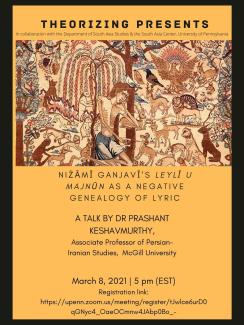Event

Niżāmī Ganjavī’s Leylī u Majnūn as a Negative Genealogy of Lyric
Abstract: Niżāmī Ganjavī’s Leylī u Majnūn, completed at the court of Shīrvān Shāh Akhsitān in Shīrvān in 1188, the third of his quintet of long narrative poems or masnavīs and one the world’s most famous love stories, has been systematically misread almost as soon as it was completed and continues to be misread today. The mainstream of this misreading, taking the form of response poems composed between the 13th and 16th centuries as well as paintings of scenes from the poem embedded in royal manuscripts of it, takes at face value the poem’s concluding claim that Majnun’s unambiguously physical and narcissistic lovesickness which takes up the bulk of the poem had in fact been his peculiar style of devotion to a metaphysical God. But when read with attention to how the poem’s many moralizing codas have little to do with Majnūn’s apparently illustrative case, this disjuncture between individual moral situation and universal moral law becomes a provocation to doubt. Niżāmī was not alone in his ironization of didacticism. He had antecedents in Naṣrullāh Munshī’s famous animal-fable Kalīla va Dimna (1140s, Ghaznavid chancellery) where the apparent universality of wisdom sayings is perverted by the fact of being uttered by self-serving characters; and in Gorgānī’s Vīs u Rāmīn (ca. 1050, Isfahan) in which Vīs bends misogynistic advice to her own ends. Indeed, Niżāmī’s irony was among the Islamic models for similar disjunctures in European vernaculars – Don Juan Manuel's 1335 Book of the Examples of Count Lucanor and of Patronio being an Old Castilian example that explicitly genuflects in the direction of its Arabic models when its moral conclusions are often only tenuously related to their cases.
And yet, the Persianate reception of Niżāmī’s poem seems to have missed this ironization of didactic postures. Perhaps this is because Majnūn’s concluding Sufi self-characterizations complemented the Sufi models of kingship in post-Mongol Islamic regimes from the mid-13th century onwards, ensuring the prestigious amplification of this misreading till the present.
Displacing this misreading, this talk aims to retrieve the singularity of Niżāmī’s Majnūn as a semi-bestial and pathologically somatic genealogy of lyric. Violating the trajectory of Niżāmī’s own legally, ritually, mystically, medically and philosophically obedient protagonists elsewhere in his quintet – to say nothing of the legal, ritual, mystical, medical and philosophical norms of Niżāmī’s milieu – Majnūn’s poetry is a symptom of his narcissistic lovesickness. He enjoys this symptom as do his readers in his diegetic world. How does the poem go about creating a character who allows us to imagine the genesis of socially offensive and aesthetically appealing poetry in the transgression of every major theoretical frame by which poetry was explained? In particular, how does Majnūn as a locus of transgressions let us infer a critique of the Quranic and Neoplatonic anthropocentrism of balāghat or the Persian-Arabic discipline of rhetoric? What do we make of the Sufi recuperation of the concluding chapters?
Bio: Prashant Keshavmurthy is Associate Professor of Persian-Iranian Studies at the Institute of Islamic Studies at McGill. His research interests focus on literary canon formation and conceptions of authorship in pre-colonial Persian and Urdu literary traditions, commentarial practices in pre-19th century Persian literary cultures, and ethical and political thought in late Mughal India. He is the author of Persian Authorship and Canonicity in Late Mughal Delhi: Building an Ark (Routledge, 2016), a study of poetics and politics in the work of the poet 'Abd al-Qādir Bedil (d.1720) and his circle, and several essays the most recent of which is "The Limits of Islamic Civility in India" in Milad Milani & Vassilios Adrahtas, Eds., Islam, Civility and Political Culture (Palgrave-MacMillan, 2020).
Lecture by Dr. Prashant Keshavmurthy, Associate Professor of Persian-Iranian Studies, McGill University
Monday, 8th March, 2021. 5:00 PM (EST)
Zoom Registration link: https://upenn.zoom.us/meeting/register/tJwlce6urD0qGNyc4_OaeOCmnw4JAbp0Bo_-
